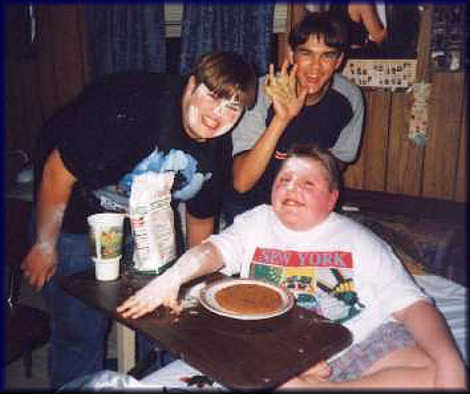Home-Based Services
 Home-Based
Program Philosophy
Home-Based
Program Philosophy
In accordance with the mission of Family Connections, the Home-Based
Services Program holds that the family is a desirable social institution
and should be supported and maintained whenever possible.
Every
family has resources and strengths which can be tapped to improve
overall functioning. Through observation and analysis of the family
structure and relationships, the family members may become more
insightful as to how certain symptoms/patterns of behavior serve a
particular function and use this as a springboard for change.
Therapeutic intervention is designed to assist families in identifying
their unique strengths, relationships, and organization. Overall
functioning may be improved through developing executor roles for
parents, decreasing marital conflict, and reducing symptoms among
children.
The Home-Based Services Program recognizes that parents
are in charge of their families and home-based services are provided to
support, encourage, and assist them in the parenting role. Therapeutic
intervention with parents does not mean assuming their role or
responsibilities.
The Home-Based Services Program further
recognizes that each family is part of a larger community system.
Intervention cannot proceed in isolation. Therapeutic intervention
fosters the interdependence of the family with its community.
Home-Based services are a comprehensive intervention with the goal being
to support and maintain all family members in their own home, thus
avoiding out-of-home placement for any child. Where that is not
possible, home-based services may assist the family in keeping a door
open for communication and reducing the likelihood of emotional cutoff.
Home-Based services are never pursued at the expense of the child's
safety and best interests.
Goals and Objectives
To assist in avoiding the necessary placement of children and aid in keeping families together
- Home-Based services will provide an adequate, least restrictive
alternative consistent with the needs of the index client and family.
- Home-Based services will provide comprehensive assessments of
family dynamics, patterns and conditions.
- Family support workers will teach skills necessary for
independent, cooperative family functioning.
To assist in the reunification of children in out-of-home placement with
their families
- Home-Based services will be provided for families with children in
placement to facilitate the transition of the index client into the family.
To prepare families to utilize existing community resources
- Family support workers will obtain services and resources from various
community agencies.
- Family support workers will identify and utilize natural social
support networks.
- Family support workers will coordinate various service and
supports needed by the child and family.
Admissions for Home-Based Services Program
Referrals for home-based services may come from a variety of sources: West Virginia Department of Health and Human Resources, probation, court, school, Head-Start,
community behavioral health centers or other social service agencies. In all cases the family should have been made aware of the referral by the referral source. Family Connections serves families in a home-based setting when it has been determined that the child or children are at risk for out-of-home placement, or the child or children have already been removed and reunification is the goal.
Risk for out-of-home placement can be established by at least one of the following:
- Child Protective Services Initial Assessment (risk factor - HIGH) and
safety plan has been completed by DHHR staff.
- A court finding that a child has committed an alleged act in a
delinquency petition and placement is probable.
- The child's level of emotional/behavior impairment presents a
danger to himself or others and psychiatric hospitalization is
probable.
Additional criteria:
- A child is in placement and the Child Protective Service case plan is to
return the child to his own home. Significant risk factors are still
present, but a case evaluation indicates safety issues can be controlled.
- The family cannot solve the problem(s) without outside
intervention.
- The conditions leading to family dissolution are treatable, and/or
correctable.
- The family and its members are willing and able to actively
participate in the service provision process and show potential to
benefit from services.
A family is appropriate for services under this program if all of the following items can be checked:
- The family is willing to accept services.
- The family is able to participate in treatment services.
- The family demonstrates potential to benefit from the services.
- Less intensive services are not sufficient to meet the family's
needs.
- The child's presence in the home does not create a safety risk
to other family members or others in the community.
- Safety of the child or children can be maintained.
The family is not appropriate if any of the following apply:
- Family is not in crisis/no impending placement or return of a child.
- Family declined services.
- Unable to insure safety of family members/community.
Therapeutic Team
The family support worker makes up one leg of the therapeutic team. The therapist and the family are the second and third leg. The entire team is supported by consultation, supervision, and a solid theoretical approach to home-based work.
Communication needs to go in every direction along the legs of this triangle. Leaving any team member out of the decision-making and planning will undermine the work
 Home-Based
Program Philosophy
Home-Based
Program Philosophy